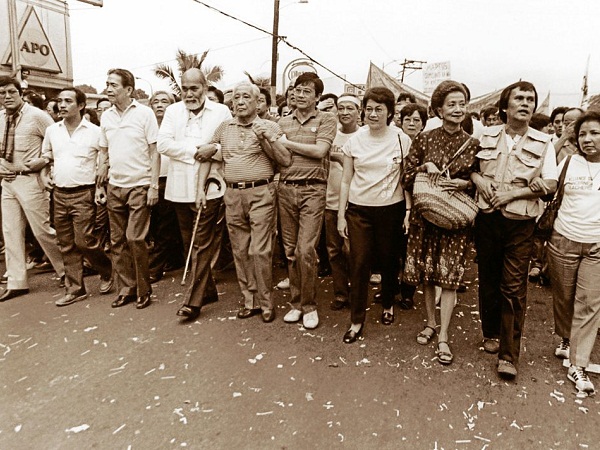Retell martial law days, DepEd urged

A PAGE FROM MARTIAL LAW HISTORY. Among the prominent anti-dictatorship protesters during the Marcos regime: From right: Etta Rosales, Behn Cervantes, Lily de las Alas-Padilla, Cory Aquino, Wigberto Tañada, Lorenzo Tañada, Ramon Pedrosa, and Ambrosio Padilla. INQUIRER PHOTO
TEXTBOOKS should not sanitize history.
The Senate committee on education on Tuesday urged the Department of Education (DepEd) to give students an accurate retelling of the nation’s dark days under martial law as it noted “glaring omissions” in the content of elementary and high school textbooks, particularly on human rights abuses and killings.
“By omitting the atrocities, you’re not (being) neutral or objective. You’re in favor of it,” Sen. Paolo Benigno Aquino IV said during a public hearing on the eve of the 44th anniversary of the declaration of martial law.
“Let’s put in numbers, the scope of atrocities,” Aquino told the panel of DepEd officials that included Education Secretary Leonor Briones, herself a victim of martial law, Undersecretary Dina Ocampo, National Historical Commission on the Philippines chair Maria Serena Diokno, and Commission on Human Rights Chair Chito Gascon.
The DepEd officials said a transition was in the offing, with an ongoing review and revision of the basic education curriculum as part of the shift to the K-12 education reform program initiated by the Aquino administration.
For the senator, such transition would help counter the spread of unfiltered information on social media, which seem to depict martial law as a “golden age” for the Philippines.
Slap on victims
Aquino also cited a chapter in a 2010 textbook for fifth grades that glorified several martial law initiatives, and even had an activity where students were required to sing a hymn that became popular during the era.
“Isn’t that a slap on the face of [martial law victims] that the youth of today are being made to sing a song from martial law?” he said, adding that the book “did not say that people were tortured, jailed and killed” under the Marcos regime.
Aquino also noted that the book did not even mention Marcos’ ill-gotten wealth: “I did not see a single part saying that corruption happened, (nor anything about) the P10-billion stolen from our country. And we’re wondering why people who are corrupt get voted into public office?”
Briones assured Aquino that the K-12 curriculum crafted in 2013 was already based on a “framework of human rights and democracy.”
Human rights
She also briefly recalled her martial law ordeal, saying she had “lost everything” during that time. “(But) I don’t have to repeat that,” she added.
She focused instead on the curriculum shift, saying schoolchildren as young as second graders would be exposed to history teaching based on human rights.
“We have a chapter in (a) Grade 6 (textbook) about dictatorship, not just in the Philippines, but all over the world. We are teaching children to be critical so that they won’t cooperate, won’t be part of a dictatorship,” Briones told the panel of senators, including Aquino, Sen. Risa Hontiveros and Sen. Sherwin Gatchalian.
Under Aquino’s questioning, Ocampo conceded that textbook authors may have been “overly cautious” about what to put in books.
She added that it was also important for (textbook authors) “to be able to put into the curriculum what we have evidence for.”
Said Ocampo: “[Textbook] writers are overly cautious, that’s the problem. They don’t want to be accused of telling children what to think, because in education, you want children to think for themselves, to critique.”
Value judgment
Diokno noted that she and a team of University of the Philippines historians had found “weaknesses” in social studies books, not just on the topic of martial law, including “factual inaccuracies (and) bias against gender, ethnicity and social class, even in Grade 1 textbooks.”
Hontiveros pointed out that, as much as textbook authors endeavor to be evidence-based, they must also input “value judgment” on the wrongs committed during martial rule.
She cited the example of countries like Belgium, Germany, Austria, Switzerland and Israel, that are enforcing laws against censoring the Holocaust.
“The effect (of martial law) on people was not neutral. So even in the remembering, the teaching, certainly this must be evidence-based, but it is important that there is value judgment—what was wrong about those violations, the denial of democratic rights,” said the neophyte senator and longtime activist.
While the DepEd had yet to give a specific timeline on when books with revamped martial law content would be published, Briones said it was an urgent matter.
“This really is a responsibility not only of DepEd but of the entire Philippine society. Because many of those who experienced the horrors of martial law are already gone, their stories already lost. There is no time to lose,” she said.














